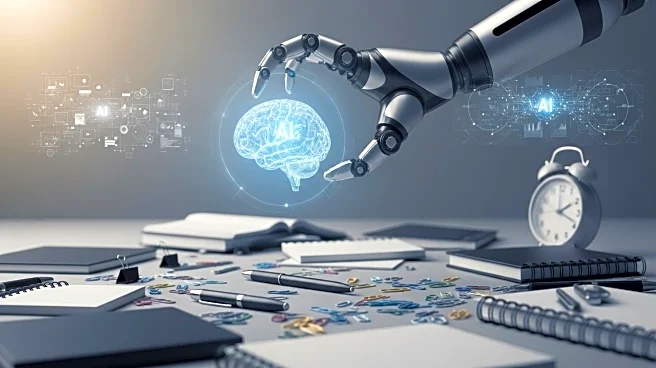What's Happening?
The global job market is undergoing significant changes as artificial intelligence (AI) becomes increasingly integrated into business operations. This shift has led to substantial job cuts across major tech companies. According to Layoffs.fyi, approximately 204 tech companies have laid off around 89,964 employees worldwide as of September 2025. Accenture, a leader in consulting and IT services, has laid off about 11,000 employees in three months, citing AI-driven restructuring and cost optimization. Similarly, Tata Consultancy Services (TCS) in India has reduced its workforce by around 12,000 employees, although reports suggest the number could be as high as 30,000. Other tech giants like Microsoft, Meta, Intel, Amazon, and Google are also streamlining their teams, focusing on AI innovation and efficiency. Panasonic, a non-tech-first company, has announced 10,000 job cuts as it pivots towards AI and energy storage technologies.
Why It's Important?
The widespread job cuts highlight the profound impact AI is having on the workforce. As companies adopt AI to enhance efficiency and innovation, many employees face displacement, underscoring the urgent need for reskilling. This trend is not only reshaping the tech industry but also affecting sectors like manufacturing, as seen with Panasonic. The shift towards AI-driven operations is creating a new economic landscape where the balance between human labor and machine intelligence is rapidly evolving. This transformation poses challenges for workers who must adapt to remain relevant in an AI-first future, while companies navigate the complexities of integrating AI into their business models.
What's Next?
As AI continues to reshape industries, companies are likely to further streamline operations, potentially leading to more job cuts. Employees will need to focus on acquiring new skills to align with the demands of an AI-driven job market. Businesses may also face pressure to address the social implications of workforce reductions, such as increased unemployment and the need for retraining programs. Policymakers and industry leaders might need to collaborate on strategies to support affected workers and ensure a smooth transition to an AI-integrated economy.
Beyond the Headlines
The integration of AI into the workforce raises ethical and cultural questions about the future of work. The rapid pace of technological advancement challenges traditional employment models and necessitates a reevaluation of labor rights and protections. As AI systems become more prevalent, issues related to data privacy, algorithmic bias, and the ethical use of AI in decision-making processes will require careful consideration. The long-term implications of AI on society and the economy will depend on how these challenges are addressed.









